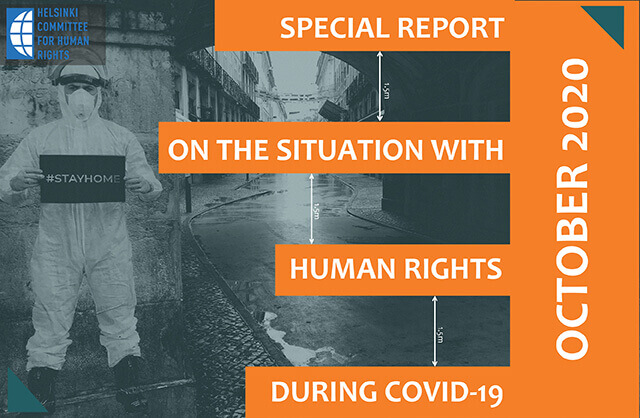Special report on the situation with human rights during Covid-19

The COVID-19 virus pandemic has caused global effects on a scale incomparable to any other event in human history. The fast-growing health crisis, which hit almost every country in the world, is causing unforeseeable economic and social consequences, from which humanity is yet to recover. Given the seriousness and uncertainty of the events, many governments, including ours, considered it necessary to declare a state of emergency in order to properly address the dangers and harms of the new coronavirus. And since in times of а state emergency the Government can take action beyond what would normally be allowed, it also meant an alarm for the vigilance of human rights defenders.
After the President of the Republic of North Macedonia had signed the regulation declaring a state of emergency on March 18 2020, the Helsinki Committee publicly stated that the state of emergency must in no way be an excuse for the competent authorities to violate human rights.
The Committee stressed that the measures to be taken must not deviate from the obligation to protect the most vulnerable categories of citizens and that human rights and freedoms must be considered. The state is responsible for providing and protecting human rights and as must not arbitrarily impede the enjoyment of human rights or arbitrarily restrict human freedoms during a state of emergency. The Helsinki Committee also advised that in accordance with domestic and international standards, the restriction of rights and freedoms must in no case be discriminatory on grounds of sex, race, colour, language, religion, national or social origin, property or social status. Arbitrary interference would be contrary to the public interest and the common good, and government-issued regulations would be contrary to international law.
Even before the state of emergency was declared, the Helsinki Committee reorganized its work in accordance with the recommendations for prevention of the Ministry of Health. We have provided uninterrupted service for free legal aid for citizens via phone and e-mail, leaving the opportunity for direct meetings in case of emergencies. And as restrictions on freedom of movement and the economic crisis meant an inevitable blow to human rights, the Committee focused on monitoring labour rights, the rights of vulnerable and marginalized groups, and those deprived of liberty during a pandemic. In addition, the organization was continuously active through the networks in which it is a member, and during the past period, it supported the joint initiatives for protection of workers.
This report is based on the data recorded by the Committee in the daily communication with citizens seeking legal aid, on the analysis of the effects of the adopted government regulations in this crisis period, as well as on the regular monitoring of the situation in individual areas.
The health crisis is far from over, and the economic and social crisis will intensify with each passing day of uncertainty and imposed restrictions. Hence, we hope that this special report will serve as a guideline in the further action of decision makers because it precisely determines whose rights have suffered the most in the past critical period and where urgent and effective intervention should be made so further damages can be prevented.



